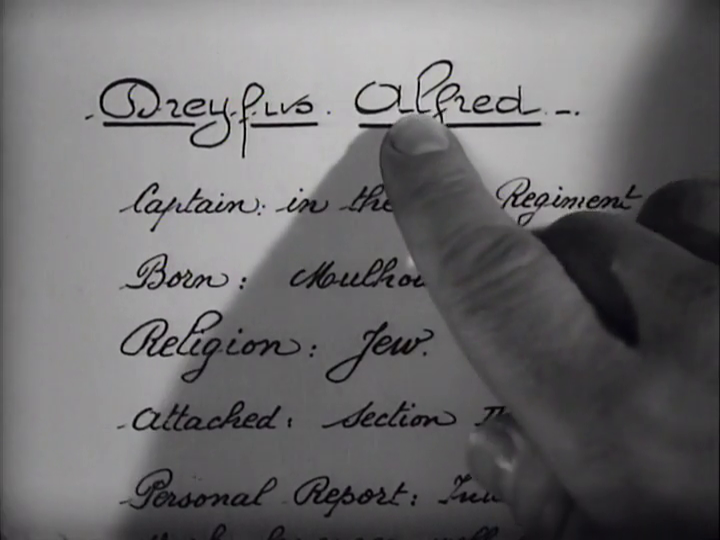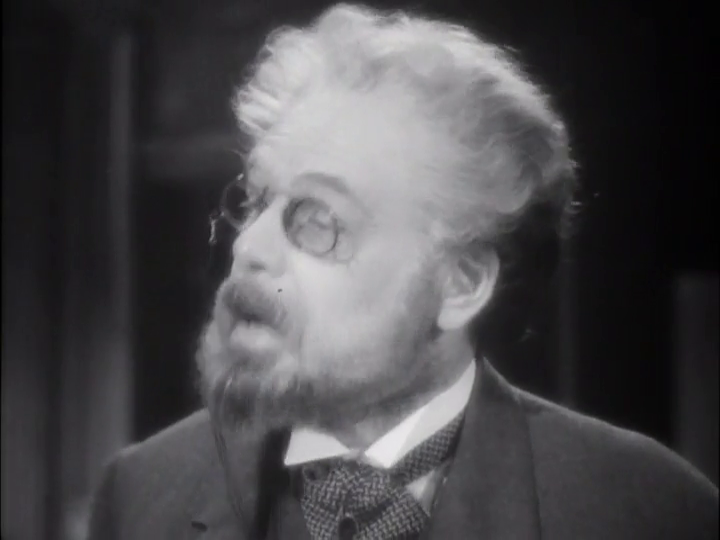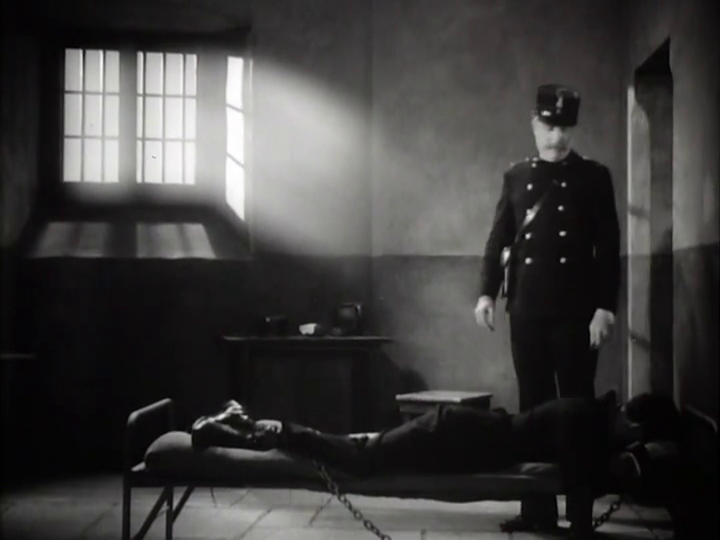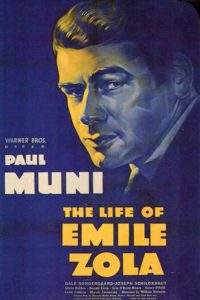|
Genres, Themes, Actors, and Directors:
- Biopics
- Courtroom Drama
- Donald Crisp Films
- Falsely Accused
- Louis Calhern Films
- Paul Muni Films
- William Dieterle Films
- Writers
Review:
William Dieterle directed this Oscar-winning biopic about France’s most famous “naturalist” author, who gained both infamy and renewed respect after speaking out against the French government on behalf of falsely accused Jewish military captain Alfred Dreyfus. Indeed, only the first half-hour of this film is focused on Zola’s meteoric rise from a penniless artist sharing quarters with his childhood friend Paul Cezanne (Vladimir Sokoloff) to a best-selling author who appears to have “sold out” and settled into a life of comfort and riches. At this point, we abruptly switch to the Dreyfus Affair, and viewers unfamiliar with this historical travesty may well wonder what’s going on with the film’s pacing and narrative focus. Naturally, Zola steps up to save the day — where else could the story be headed? — and is appropriately honored as a hero.
Peary doesn’t discuss this movie in GFTFF, but in Alternate Oscars he admits that while “Muni was terrific” as a “man with the courage of his sometimes foolhardy convictions”, the “film [he] loved so much as a kid is quite tiresome today”, and he questions how the Academy could consider “honoring this biography in which there is no verbal mention that Alfred Dreyfus was Jewish.” Along those lines, as DVD Savant writes in his review:
At only one point in The Life of Emile Zola is Alfred Dreyfus identified as Jewish, and I’ll bet that the writers and producers of the movie had to fight to keep that reference, seen only as a fleeting word on a statistical blotter.

The script emphasizes the incompetence and corruption in the French general staff but barely touches on the heinous anti-Semitism that was at the heart of the Dreyfus affair.
I’ll agree that even a brief glimpse of the words “Religion: Jew” on a piece of paper — after which Dreyfus is accused of a crime without any evidence — remains a minor but laudible gamble on the part of the filmmakers at a time when European anti-semitism was so rampant. While the film focuses on military corruption more broadly, the point is clearly made that celebrities with pulpits should be brave enough to use them.
Redeeming Qualities and Moments:
- Paul Muni as Emile Zola

- Tony Gaudio’s atmospheric cinematography

Must See?
No, though it’s recommended for its historical importance as an Oscar-winning feature. Listed as a Personal Recommendation in the back of Peary’s book.
(Listed in 1001 Movies You Must See Before You Die)
Links:
|




One thought on “Life of Emile Zola, The (1937)”
First viewing. A once-must – for its solid place in cinema history as a worthy Oscar winner for best film, for its subject matter, and for the direction and performances.
I’m not surprised that it took me this long to catch up with this film. In earlier days, I let a number of Paul Muni films pass me by – and I know the reason. I had seen one or two examples of his work (I forgot which ones) and found his acting to be a bit overdone.
However – having just seen this film and ‘I Am A Fugitive from a Chain Gang’ (recently), I’m willing to hold off on a conclusive opinion; he does fine work in both films. (Schildkraut’s performance here, as well, brought him a well-earned Oscar.)
Those who intend to watch the film are advised to check the Wikipedia link on the film (below) to understand some of the issues that were in play during the film’s production (i.e., why the word ‘Jewish’ was suppressed).
If I have any real problem with the film, it’s an intermittent one with the screenplay. Credited to three writers. the (Oscar-winning) script sometimes seems somewhat over-earnest – whether it’s in a depiction of ‘young and starving but noble artist’ or ‘bold hero’ or ‘suffering wife’ or what-have-you – and this shows up in the dialogue. ~which is to say that the dialogue is usually quite natural-sounding overall but there are stretches of it that seem less so. But, as I said, it’s not overly troublesome.
What impressed me most on this viewing is the film’s continued relevance. For example, it caused me to think of our current situation here in the US – with an ‘administration’ (like the military officers in the film) going out of its way to spread lies in order to control its deceit and pump up its voting base. So ‘The Life of Emile Zola’ serves as a fine example of (not only progressive thinking but) protection of the truth – and what that can cost individuals who strive to uphold it.
https://en.wikipedia.org/wiki/The_Life_of_Emile_Zola